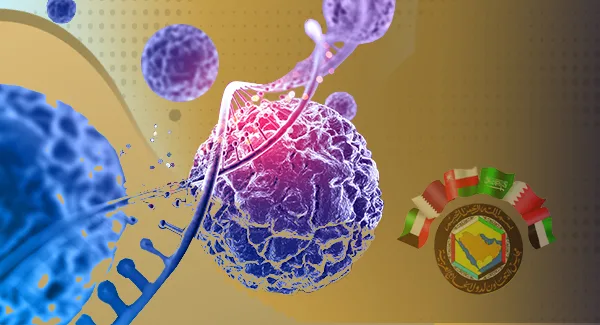Cancer continues to be a leading cause of morbidity and mortality worldwide, and the Gulf Cooperation Council (GCC) countries—comprising Bahrain, Kuwait, Oman, Qatar, Saudi Arabia, and the United Arab Emirates (UAE)—are no exception. A recent study led by the International Agency for Research on Cancer (IARC) and regional researchers has shed light on the disparities in cancer incidence across the GCC, emphasizing the importance of National Cancer Control Programs (NCCPs). These programs aim to reduce the burden of cancer through prevention, early detection, treatment, and palliative care.
This article delves into the unique cancer landscape of the GCC, evaluates the progress made through NCCPs, and explores the challenges that continue to hinder their implementation.
Understanding Cancer Incidence in the GCC
Cancer rates are rising across the Gulf Cooperation Council (GCC) countries, driven by aging populations, lifestyle changes, and improved diagnostic capabilities. With over 42,000 new cases reported in 2020 and a projected 59% increase by 2040, breast, colorectal, and lung cancers dominate the region’s cancer burden, emphasizing the need for comprehensive, tailored strategies to mitigate these trends.
A Growing Health Crisis
Cancer incidence in the GCC has risen dramatically over the past decade. According to IARC’s 2024 report, the region recorded 42,475 new cancer cases in 2020. Saudi Arabia, home to nearly two-thirds of the GCC population, reported the highest number of cases, accounting for over 27,000 diagnoses annually. Breast cancer remains the most prevalent malignancy among women in the GCC, comprising 30% of all female cancer cases. Colorectal cancer follows as the second most common type, affecting both men and women.
This trend is compounded by the region’s demographic shifts. The GCC population is aging rapidly, with individuals aged 60 and older projected to double by 2040. Combined with lifestyle changes such as increased tobacco use, sedentary behaviors, and rising obesity rates, these factors are driving a surge in cancer cases.
Projections for 2040
IARC estimates a 59% increase in cancer incidence across the GCC by 2040. Mortality rates are expected to rise in parallel, with late-stage diagnoses and limited access to advanced care remaining critical concerns in certain areas. These projections underscore the need for comprehensive and regionally tailored NCCPs to combat this escalating health challenge.
Progress in National Cancer Control Programs
GCC countries have made significant strides in implementing National Cancer Control Programs (NCCPs). These initiatives focus on prevention, early detection, access to treatment, and palliative care. Programs like Qatar’s national screening for breast and bowel cancers and Saudi Arabia’s expanded cancer centers under Vision 2030 illustrate the region’s commitment to improving cancer outcomes.
Preventive Efforts
Prevention has been a cornerstone of NCCPs across the GCC. Public health campaigns targeting key risk factors such as smoking and obesity have gained momentum. For instance, the UAE has implemented a nationwide HPV vaccination program, achieving a coverage rate of 95% among school-aged girls, significantly reducing the risk of cervical cancer. Similarly, Kuwait’s tobacco control policies, including high taxation and public smoking bans, have led to a 15% reduction in smoking prevalence over the past decade.
Early Detection Through Screening
Screening programs for early detection have shown measurable success. Qatar’s National Breast and Bowel Cancer Screening Program, for example, achieved a participation rate exceeding 60% among eligible women. The UAE reported a 20% increase in early-stage breast cancer diagnoses following the introduction of its national screening initiative. These programs are vital in detecting cancers at treatable stages, reducing mortality rates.
Improved Access to Treatment
Investments in healthcare infrastructure have enhanced access to state-of-the-art oncology treatments. Saudi Arabia, under its Vision 2030 initiative, has expanded specialized cancer centers across the country. This has significantly reduced reliance on medical tourism, ensuring continuity of care for patients. Advanced therapies, such as immunotherapy and targeted treatments, are now more widely available, improving survival outcomes for many patients.
Palliative Care Integration
Oman has led the region in integrating palliative care into primary healthcare settings, ensuring that terminally ill patients receive compassionate, end-of-life care. Other GCC countries are following suit, recognizing the importance of holistic approaches to cancer management.
Challenges Hindering NCCP Effectiveness
Despite these achievements, significant barriers continue to impede the success of NCCPs across the GCC.
Healthcare Access Disparities
Urban areas enjoy advanced healthcare facilities, but rural populations in Saudi Arabia and Oman often face limited access to screening and treatment services. This disparity creates delays in diagnosis and reduces the likelihood of successful treatment outcomes.
Limited Data Infrastructure
Robust cancer registries are essential for tracking incidence trends and evaluating program outcomes, yet they remain underdeveloped in many GCC countries. For example, while Qatar and the UAE have made strides in establishing national databases, other countries lack comprehensive systems to collect and analyze cancer-related data.
Workforce Shortages
The shortage of trained oncologists, radiologists, and palliative care specialists continues to strain healthcare systems across the GCC. Addressing this gap is crucial to meeting the increasing demand for cancer services.
Cultural and Social Barriers
Cancer-related stigma remains pervasive in several GCC countries. Fear of diagnosis and misconceptions about treatment often discourage individuals from participating in screening programs or seeking timely care. Public awareness campaigns must address these cultural barriers to improve community engagement.
Evaluating NCCP Effectiveness
The success of NCCPs is evident in increased early detection rates and improved access to advanced treatments. Screening initiatives in the UAE have led to a 20% rise in early-stage breast cancer diagnoses, while Saudi Arabia’s targeted therapies have reduced treatment delays by 30%. However, challenges like healthcare disparities, workforce shortages, and limited data infrastructure highlight the need for continued evaluation and enhancement of these programs.
Early Detection and Outcomes
Data from screening programs highlight the impact of early detection. In the UAE, breast cancer mortality rates have decreased by 15% since the introduction of national screening initiatives. Similar results have been observed in Qatar, where bowel cancer mortality rates dropped by 10% due to increased participation in colonoscopy programs.
Prevention Strategies
Preventive measures, particularly in tobacco control, are beginning to show results. Kuwait’s anti-smoking initiatives, combined with public education campaigns, are expected to contribute to a long-term decline in smoking-related cancers.
Treatment Accessibility
Saudi Arabia’s establishment of comprehensive cancer centers has not only improved access to care but also reduced the economic burden of treatment. For example, centralized oncology services in Riyadh have shortened treatment waiting times by 30%, improving patient outcomes.
Future Directions for NCCPs in the GCC
To further enhance the effectiveness of NCCPs, GCC countries must adopt targeted strategies that address current challenges and leverage existing opportunities.
Building Cancer Registries
Developing robust cancer registries across the region will enable accurate tracking of incidence rates and program outcomes. This data will provide critical insights for policymakers and healthcare providers, allowing for evidence-based decision-making.
Expanding the Oncology Workforce
Investing in training programs for healthcare professionals specializing in oncology and palliative care is essential to address workforce shortages. Collaborations with international institutions can accelerate the development of local expertise.
Improving Infrastructure in Underserved Areas
Expanding healthcare facilities in rural and remote regions is vital to ensure equitable access to cancer care. Mobile screening units and telemedicine can also play a role in reaching underserved populations.
Enhancing Public Awareness
Culturally sensitive education campaigns can help reduce stigma and encourage participation in screening programs. These campaigns should be tailored to address specific misconceptions and fears prevalent in the region.
Fostering Regional Collaboration
Collaboration among GCC countries can optimize resource sharing, streamline research efforts, and standardize cancer control policies. Regional initiatives could also focus on collective bargaining for advanced therapies, reducing costs for member states.
At Opal Biopharma, science meets innovation to create powerful solutions for gene therapy, cancer, and diabetes.
Conclusion
The rising cancer burden across the GCC underscores the critical need for tailored National Cancer Control Programs. While significant progress has been made in prevention, early detection, and treatment, challenges such as healthcare access disparities, workforce shortages, and cultural barriers remain. Addressing these challenges through targeted strategies and regional collaboration will be essential in reducing cancer incidence and mortality rates.
By continuing to invest in comprehensive NCCPs, GCC countries can not only improve patient outcomes but also set a global example for cancer control in rapidly developing regions. The fight against cancer is far from over, but with sustained efforts and innovative approaches, the GCC is well-equipped to lead this charge.

